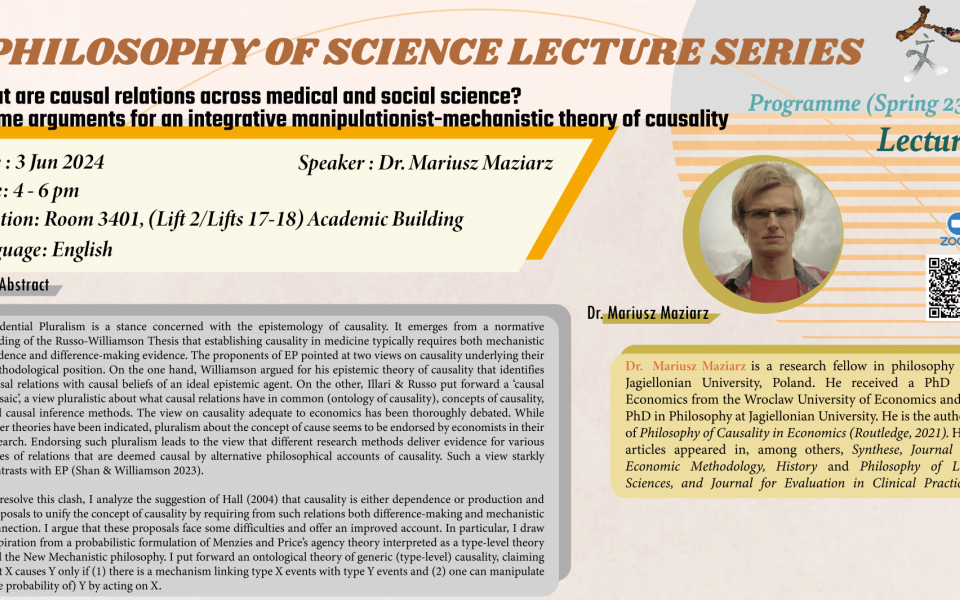Philosophy of Science Lecture Series - What are causal relations across medical and social sciences? Some arguments for an integrative manipulationist-mechanistic theory of causality
Evidential Pluralism is a stance concerned with the epistemology of causality. It emerges from a normative reading of the Russo-Williamson Thesis (Russo & Williamson 2007; 2011) that establishing causality in medicine typically requires both mechanistic evidence (results explaining how a purported cause produces its effect) and difference-making evidence (studies showing an association between the cause and effect). The proponents of EP pointed at two views on causality underlying their methodological position. On the one hand, Williamson (2005; 2006; 2007) argued for his epistemic theory of causality that identifies causal relations with causal beliefs of an ideal epistemic agent. On the other, Illari & Russo (2014) put forward a ‘causal mosaic’, a view pluralistic about what causal relations have in common (ontology of causality), concepts of causality, and causal inference methods.
The view on causality adequate to economics has been thoroughly debated (e.g., Hoover 2001; Moneta 2005; Claveau 2012; Reiss 2015; Henschen 2018; Maziarz & Mróz 2020a; Henschen 2020; Maziarz and Mróz 2020b; Maziarz 2020). While other theories have been indicated (e.g., some versions of the manipulationist view on causality or Suppes’ probabilistic account, pluralism about the concept of cause seems to be endorsed by economists in their research. Endorsing such pluralism leads to the view that different research methods deliver evidence for various types of relations that are deemed causal by alternative philosophical accounts of causality. Such a view starkly contrasts with EP (Shan & Williamson 2023).
To resolve this clash, I analyze the suggestion of Hall (2004) that causality is either dependence or production and proposals to unify the concept of causality by requiring from such relations both difference-making and mechanistic connection (Campaner 2006; Ney 2009; Joffe 2013). I argue that these proposals face some difficulties and offer an improved account. In particular, I draw inspiration from a probabilistic formulation of Menzies and Price’s (1993, p. 190) agency theory interpreted as a type-level theory (Hausman 1998, p. 86) and the New Mechanistic philosophy (Glennan 1996; Machamer, Darden & Craver 2000; Craver and Bechtel 2007; Glennan 2010).
Mariusz Maziarz is a research fellow in philosophy at Jagiellonian University, Poland. He received a PhD in Economics from the Wroclaw University of Economics and a PhD in Philosophy at Jagiellonian University. He is the author of Philosophy of Causality in Economics (Routledge, 2021). His articles appeared in, among others, Synthese, Journal of Economic Methodology, History and Philosophy of Life Sciences, and Journal for Evaluation in Clinical Practice.
